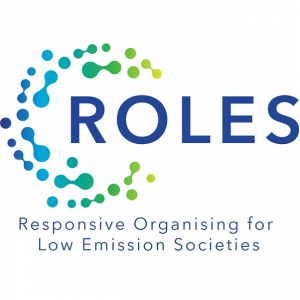Organiser: ROLES project
Wednesday, 20 July 2022 | 14:00 – 16:00
Room Seminar 1
Format: Case study presentation + Hybrid rounded table
Digitalisation of energy infrastructure is supposed to enable electric mobility, smart charging, residential energy monitoring and renewable energy integration for a transition to low-carbon energy systems. It is expected to play a key role to achieve a deep decarbonisation, and enhancing efficient and affordable energy use for all at the same time. However, whether it delivers what it promises is open to discussion. Digitalisation may rise or excaberate certain problems or injustices, for example related to data privacy, governance processes, democratic processes, outcomes, and goals. The JPI Climate SOLSTICE funded project ROLES analyses how ongoing digitalisation of energy infrastructure in three mid-sized European cities intends to accelerate the decarbonisation, avoiding new inequalities and vulnerabilities and reducing old ones. ROLES is finally intended to identify pathways to Digitalise for Deep Decarbonisation (DDD) in socially and environmentally just ways.
By now, ROLES has analysed the digitalisation processes in three cities and sectors: the diffusion of smart energy meter 2.0 in the residential sector in Trento (IT); the changes in public electric mobility system in Bergen (NO); and the management and organisation of solar neighbourhood in Brighton (UK). About 30 interviews with experts and 30 interviews with citizens have been carried out and analysed in each case study, while a process composed by deliberation events is kicking off for identifying and visualising how power dynamics across stakeholders impact pathways for DDD.
By analysing the digitalisation process and defining DDD pathways, the ROLES project contributes to the study of transformative and democratic governance, with an emphasis on the distribution of power and the relevance of accountability. ROLES contributes also to the study of citizens’ agency, with an emphasis on justice, social inclusion, and vulnerability
Programme:
The side event will kick-off by presenting insights from the the first year of the project. Participants are asked to critically review the activities and results of the Trento case study. The aim of the event is to open a discussion on how the themes of the ROLES project fit into the wider and current global context (COP26, Covid-19 pandemics, war etc.), emphasising the relation with the debate on climate and energy democracy.
The side event will have a hybrid format, with some experts participating via online platform.
Moderators
- Sonia Gantioler (Eurac Research) – Senior researcher
Keynote speakers
- Jessica Balest (Eurac Research) – Senior researcher
- Nives Della Valle (Joint Research Centre of the European Commission) – Scientific Officer
- Sonia Gantioler (Eurac Research) – Senior researcher
- Siddharth Sareen (University of Bergen) – Associate Professor, Department of Geography, Centre for Climate and Energy Transformation
- Adrian Smith (University of Sussex Business School) – Professor of Technology and Society (SPRU – Science Policy Research Unit)
- Silvia Tomasi (Eurac Research) – PhD student
- Federico Voltolini (Eurac Research) – Junior researcher

